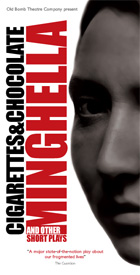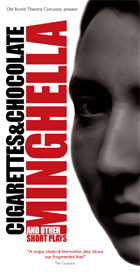Rehearsals are at that funny stage now before lines are learned. At the moment, I feel the priority is to assess the potential and work out which buttons I might be able to press down the line.
This week we concentrated on voice work. It is amazing the difference a good vocal warm up makes (thank you Susan) and straightaway you notice a subtle increase in actors’ vocal range. If they’re relaxed and breathing in an unforced way, the nuances of characters and their thoughts begin to shine through and illuminate the scenes. Each of the plays demand lots of stillness, and because of that, everyone is instinctively beginning to flex their voices to compensate. At this stage, I think the big challenge of presenting Minghella’s work is to rein in the vocal and physical movement, and let the words speak for themselves. We’ll see.
We have been breaking down the longer monologues, looking for the changes in thought, identifying the key images, agreeing the climactic moments, and all the time prising out the meaning. The latter isn’t easy with so much buried beneath the surface. The digging requires questions of actors, suggestions, opposing points of view, and sometimes finding the raw nerve. As the actors explore, the pressure of time means that you have to step in quickly when you think you’ve seen a blind alley. With six weeks to rehearse, the advantage we have over a professional company is that actors have a longer period to absorb their roles, but with less time together, there is pressure to make decisions quickly. It’s all a bit like being a teacher at times – planning lessons, setting homework and ending the playtime.
Sarah Jane Dickenson, a lecturer in Drama at the University of Hull, generously shared her experience of interviewing Anthony Minghella. Reflecting on our phone conversation in lieu of a discussion at rehearsal (her car was stuck in the East Yorkshire snow at the time), Minghella told her that Cigarettes and Chocolate was the piece of work he most wanted to be remembered by. His writing was absolutely influenced by his childhood – the large vociferous Italian family in which he grew up meant that you struggled to make yourself heard – so his writing is all about giving voice to the silent and repressed. He was fascinated by Beckett, who of course was fascinated by silence. When the character of Gemma says ‘but the silence, listen, how rich it is, how pregnant, how full…’ you know exactly where it’s coming from.
Anyway that’s what I think. Jon is my assistant and will be designing an audio landscape for the plays. He’s been listening to Bach’s Mathew passion (which is incredibly long) and is planning to import suitable noise and effects from North London. I asked him to emerge from his cocoon…
‘Just back from the second rehearsal after the Christmas break. It’s very interesting, as I’m getting to see each scene leap off the page. I’ve read these scenes a number of times of course, and we’ve discussed each one in some detail as a company, but when you see individual actors inhabit their parts, suddenly the text comes alive in a way that you can’t possibly imagine on your own. You imagine something, but it’s not the actual reality of the play performed with these particular actors. Each individual actor brings himself to the text, and so the text comes alive in a unique way. It’s a privileged position to be assistant director, as you get to observe this process, to watch actors in the early stages struggle to make sense of the text. I’ve also been getting lots of ideas for sound. Watching each scene being built from the bottom up means you get lots of time to think and listen. You can watch the scene being run two or three times, and every time, you imagine the sound, and so though this process you are planning and testing out ideas. I guess it’s the same process as sitting with the text and planning it out, but you have the actors in front of you realizing the text, which is a much more interesting and inspiring experience.’ (Jon Hughes)
Maybe I’ll let one of the actors have a go at this blogging lark.
Paul Osborne
Filed under: Cigarettes & Chocolate | Tagged: Directing, Director, Old Bomb Theatre Company, Paul Osborne, York, York Theatre Royal | Leave a comment »




